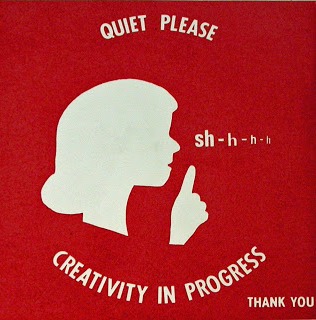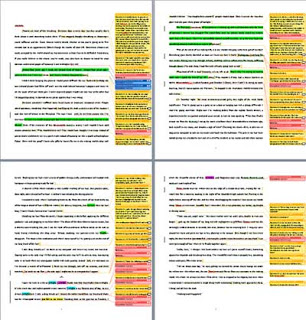Yesterday I wrote the first two chapters of Sing, Sweet Nightingale‘s sequel (currently titled TDWS Book 2). Again. Seriously. This is the fourth time I’ve tried to start writing this book. And I will probably do it at least one more time if the end of SSN changes again. I told my mom this last night and she just shook her head and said, “I don’t know how you do that. Sitting down to redo the same thing that many times would drive me crazy.” Honestly what drives me crazy is knowing that for the next eight hours I can’t sit down and work on those chapters I’ve already worked on so many times.
On John Scalzi’s blog Whatever, he has a wonderfully blunt article called Utterly Useless Writing Advice. Seeing as I disagree with the title, I’m going to recommend you read it. It’s long, but worth it. In the introduction, he explains a little bit about who he is and why you should listen to what he has to say:
People are always asking me for advice on how to become a writer, because they assume (ha!) that I am a successful writer. My psychological and egotistical needs being what they are, I won’t argue this point. I am, in fact, a fairly successful writer, if you define success as “making a good living doing nothing but writing.” I do make a good living; I don’t do anything else for a living but write. (If you define success as “being Stephen King,” of course, I’m a miserable freakin’ failure. But let’s not.)
I’ve been a professional writer since June of 1990, when I got my first paid writing job as an intern for the San Diego Tribune, where I wrote music and concert reviews and other entertainment pieces. That was the summer before my senior year in college; when I got back to college, I wrote freelance entertainment articles for the Chicago Sun-Times. After college, I got — far more through an amazing stroke of luck and the fact I was dirt cheap than by my own talents, let’s be clear — a job as the movie critic for the Fresno Bee. I did that for five years, after which I joined AOL as its on-staff writer and editor. AOL laid me off in 1998 (this is a polite way of saying I was fired, since it was a layoff of one) and I became a freelance writer. I’ve been doing this ever since.
What follows is more introduction and twenty questions writers need to know the answers to. Scalzi answers most of the questions from the perspective of a freelance writer, but honestly most of the info applies to writers of any sort. And it’s a really great reality check. This one in particular:
10. I’ve sold an article! I’ve sold two! Should I quit my day job?
Hell, no. Don’t be an ass.
People who want to be writers look on their current jobs like they’re chaining them down. If only they could break free of these jobs! Then they could write all the time! And be free! Oh joy!
Crap on a stick. Fact: Most people couldn’t write all the time, even if they were free to do so. Even full-time writers (i.e., reporters and such) aren’t writing every single moment of the work day; they’re doing other stuff, including (yes) avoiding writing — because once writing is actual work, one desires to run away from it from time to time. I sure as hell don’t write all the time, and this is my day job.
Another Fact: Most writing pays for crap (more on this soon). Quitting your day job to write full time, especially if you’re writing freelance, means you take a HUGE salary drop, no matter how little you’re making now. And if you’re just starting off, it’s hard to make sales — so you’ll be doubly screwed.
My suggestion: If you’re starting off as a freelance writer, do it in your spare time — after work and on weekends. Don’t ditch your day job to become a writer; let your day job support you as you work on perfecting your craft. It’s a risk-free way of building that writing career (also, if the writing career doesn’t pan out, you don’t have to come crawling back at reduced pay and status). Most beginning freelancers don’t have enough work to keep them busy anyway — they just spend most of their time worrying about how the hell they’re going to pay their bills.
But, I hear you say, that’s extra time I’m working! Yeah? So? If you weren’t working on writing in the evenings what would you be doing? Watching Friends, or Survivor or playing video games or some crap like that. Yeah, you’ve got the time, pal. You just have to decide you want to do it.
So, when should you quit your day job? This is easy: You should quit your day job no earlier than when the amount of money you regularly and consistently make from writing exceeds your current day job income by 30%. That’s right, you ought to be making more as a writer than you do from your day job in order to quit.
Why? Because the minute you quit your day job, you lose your employee benefits, your 401(k), and your employee contribution to your social security taxes. You have to pay for all of that yourself now. The minute you become self-employed as a freelancer, your tax burden jumps at least 15% (self-employment tax, don’t you know), and you have to file quarterly.
You have to earn at least 30% more than what you make from your day job in order to live like you do did off your day job income. This can be ameliorated somewhat if you have a spouse or significant other whose health insurance or benefits you can latch onto, but no matter what, you’re still taking a big hit.
Here’s the deal: Unless you’re working at Burger King getting people their fries, you probably won’t make as much writing as you do at your day job. So unless the thought of continuing work at your day job fills you with such a suicidal horror that you want to slit your wrists the moment you slip into your cubicle, don’t quit. And if you do quit your day job, think about getting a different day job that has all those cushy benefits and 401(k)s, one that doesn’t make you want to perforate your skull with a power nailgun.
Don’t ever quit your day job unless not quitting your day job starts cutting into your total income potential. Really, that’s what you should consider.
Remember also that many famous writers wrote books and columns and whatnot while holding down day jobs. Grisham and King had day jobs (lawyer and teacher, respectively). Scott Adams kept his cubicle job until he was a millionaire. Wallace Stevens, a Pulitzer Prize-winning poet and my personal favorite example of day-job-ness, was an insurance executive until the day he died. And so on. Day jobs don’t keep you from writing. In fact, in a lot of cases, a day job can keep you writing, building your craft and your clip file while keeping you and your family fed.
Give it serious thought before you let your day job go.
This is the kind of thing I need to read on days like today where I start getting all grumpy that my day job interferes with my creative work. Without my day job, I wouldn’t have enough money to eat, would have no car insurance, no vacation time, nothing. One day I’ll quit and do it with a smile on my face, but for now I just have to make notes on the legal pad on my desk when ideas pop into my head and go back to the work that pays my bills. Because success in the long run sometimes means sacrifice today.
Like this:
Like Loading...











